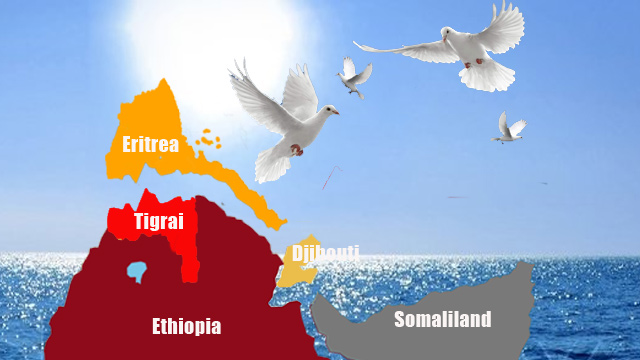The Captivating, But Dubious Politics of Ethiopia’s Abiy Ahmed

Since Dr. Abiy Ahmed burst onto the Ethiopian political scene as the country’s new prime minister under five months ago, much has been said and written about his background, vision and reformist agenda as well as the support he has been gaining as a leader. The level of public support that met PM Abiy Ahmed’s new leadership has been unquestionably intense and widespread. The decisions he took, reforms he initiated and the ideas he promoted have earned him the support of almost all sectors of the population, domestically and the praise of governments and politicians, internationally.
Much of these changes and developments have, of course, been documented in media accounts and reports. This article utilizes some of this information to try and understand the nature of the observed public reaction, identify some of its underlying motives and analyze the shift it is likely to undergo with time. It also takes a brief look at the new leader’s political philosophy and some of its inherent weaknesses.
Public Reaction: Motives and Potential Shifts
Experts in Social and Behavioral Science, Social Psychology and related disciplines would use concepts and terminologies unique to their professions to expound why and how public sentiment shapes up in support of, or opposition to, major political incidents, events, and processes. But such highly technical analyses of the subject are bound to be too complex for public discourse where lay people, such as this writer, may find it difficult to understand the nuances of profound treatment of the subject. A public discussion that would be simple, but insightful for the “common person” is one which uses plain, everyday language as a medium, general information as input and down-to-earth common sense as an analytical tool.
Taking such a rational but non-technical approach, the reaction that the public displays vis-à-vis social and political events and processes can be classified into distinct types based on the motive that prompts the reaction. For the purpose of this article, the following general categories of public reaction can be identified:
- Herd (or mob) mentality/Attitude: a state in which people are influenced by their peers to adopt certain behaviors (or positions) on a largely emotional, rather than rational basis;
- Go-with-the-flow attitude: a kind of “join others in the action” attitude – a conscious decision to go along with what people around you think, feel and do;
- Feel-good Attitude: the tendency to want to have happy feelings and to believe that one’s wishes are being fulfilled. This makes people focus selectively on those elements of an event/process that appeal to their emotions while ignoring related unfavorable ones;
- Skeptical/Questioning Attitude: Thinking ‘out of the box’ – the tendency to critically examine where things are heading before drawing conclusions and/or committing oneself to a specific outcome.
This writer believes that all these public-reaction categories have contributed – albeit to varying extents – to the support the new Ethiopian leader has been able to garner for his nationalist-reformist themes across sections of his population. The same holds true for the enthusiasm that people in the region have exhibited for the style and substance of his leadership.
1. Initial Public Reaction – Public opinion regarding the PM was initially lopsided in its distribution across the public-reaction categories outlined above. The majority of opinions seemed to have motives that fall on the emotional rather than the rational domain of the public-reaction spectrum. At the extreme end of that emotional domain have been views which ascribe divine qualities to the premier’s powers and abilities. Indeed, a few of these fanatical supporters have gone to the extent of variously describing the prime minister as a saint, a prophet and an angel!
Nearly all the reforms the PM has introduced and the decisions he has taken are consistent with the demands and wishes that the public had on issues. As such, his reformist vision and inspiring rhetoric could not, but earn him overwhelming support and immense popularity among his population. In addition, like any other mania, the cult-like admiration of a political leader invariably entails extensive canonization and apologia that stifle legitimate criticism or dissension thereby giving a false impression of universal public support.
2-Shift in Public Opinion – As the initial public euphoria wears off and reality sets in, one would expect to see a change in the distribution of people’s views across the public-reaction categories with popular sentiment shifting towards the rational end of the spectrum. It is inevitable that the governance process will, in due course, transition from rhetoric to decision-making and execution some of which may adversely impact the public. Others may end up ruffling the political feathers of key constituents in the country and/or those of political forces abroad.
Soon, contentious issues and problems will come to the fore which, when tackled, will lead to divergence between government policy-choices on the one hand, and the expectations and preferences of the population on the other. One outcome of these dynamics will likely be a shift in public opinion in which more people abandon the emotion-based views and positions they adopted under the euphoric conditions that prevailed following the PM’s election, and replace them with rational ones that derive from facts and practical considerations.
An Emerging Political Philosophy
Having changed governments last April, Ethiopia is being initiated into a political philosophy that its new leader has been pushing with a moralistic fervor reminiscent of advancing religious agendas than of promoting political thoughts. It is as if the PM’s approach to (and philosophy about) the affairs of his country and the wider Horn of Africa region are inspired more by a spirituality that invokes the ‘basic goodness of man’ than by a worldly outlook that acknowledges the realities of the rough-and-tumble world of national/global politics.
His speeches, town-hall meetings, and parliamentary engagements have expounded a political philosophy that is rooted in the concept of Medemer or “Addition” – a notion of joining hands or ‘coalescence-in-spirit’ of social and political forces. The PM advocates this philosophy as the best hope for Ethiopia and the region arguing that it would lead to peace, democracy, justice and prosperity for all provided its implementation is joined in by political parties, social groups, economic entities (at national level) and populations, governments and countries (at regional level).
This characterization notwithstanding, the philosophy is too simplistic (and its symbolizing “mathematical formulation” of “Addition” too rudimentary!) to have practicality or realism in today’s complex world. The message of love, forgiveness, reconciliation, and unity on which it is based is undoubtedly pleasing to the ear and soothing to the spirit. But it does little to address the tragic and dangerous dichotomies – the mighty vs. the downtrodden, the privileged vs. the depraved, the affluent vs. the destitute, the corrupt vs. the righteous – as well as the deep-seated ethnic animosities that beset African societies today. There can be no denying that resolving these monumental problems is a seemingly unachievable task which requires a great deal more than pacifist calls for Medemer.
At the moment, it remains unclear if this is all there is to PM Abiy’s political philosophy; or whether this is just an enticement meant to win public trust as foundation for a more profound, enlightened political thought which he may unveil at a later date, or simply ease in as an outgrowth of the existing one.
Inconsistencies and Contradictions
Medemer is not only problematic as a concept, but the way it has been practiced thus far also raises serious integrity questions as demonstrated by the following examples.
1-Partnering with a Tyrant – There is no doubt that the Ethiopian leader has long been familiar with President Isaias Afewerki’s unique credentials of despotism. He sure knows that his Eritrean counterpart presides over a one-man system that has subjugated and impoverished his people; that the latter has ruled without a constitution and a legislature, but with a sham judiciary where rule of law and due process have long been forced out by the dictator’s decrees and whimsical decisions. The prime minister is also aware that Isaias’ policies have forced Eritrea to remain mired in stalemated wars with its neighbors for most of its 27-year independent existence – a situation that earned the country nothing but economic ruin and international isolation.
Despite these truths, however, the Ethiopian leader has shown, in words and deeds, his willingness and readiness to do business with Isaias Afewerki. Worse, he has unabashedly idolized the dictator by affectionately addressing him by his nickname, and by engaging in distressingly excessive hugging, hand-holding, back-patting, teasing and laughing with the man at official functions during their visits to each other’s capitals. It is, therefore, puzzling how the ideals and principles that the PM advocates, if indeed genuine, allowed him to accept the tyrant as “partner” in an effort to bring peace, democracy, and progress to the region!
2- Meaningless borders – Since his election to the premiership, the Ethiopian leader has persistently reasoned in his speeches and official pronouncements that national borders in Africa were drawn by colonial powers and are therefore meaningless. Assuming sincerity of this statement, one would expect the prime minister to offer an idea of how Africa could extricate itself from the political quandary of comprising states whose politico-geographic identities are defined by ‘meaningless’ borders. Instead, he appeared to contradict himself by concurrently advocating economic integration of the Horn countries – states that owe their political identities to the very colonial boundaries that he trivializes.
The writer sees this political doublespeak of the prime minister as being part of his grander political gamesmanship in which he has strategized to (i) raise claims of ‘meaningless borders’ in anything related to Eritrea thereby encouraging his people to cling to the pipe dream of eventual “unification” of Eritrea with Ethiopia, and (ii) pledge to respect colonial borders by conducting the rest of his foreign policy within the framework of existing political boundaries in the continent.
Needless to say, the PM is well aware that ‘sanctity of colonial boundaries’ is one of the fundamental tenets of the Organization of African Unity (OAU) – later, the African Union (AU) – without which the continental organization could not have held itself together. So, for an AU’s basic principle to be persistently vilified as meaningless by the leader of the very country which hosts its headquarters would normally be considered an affront to the organization and the ideals it stands for. But the prime minister seems to have smartly figured that his remarks on borders will not evoke any protest from an organization that has neither the grit nor rectitude to stand up to manipulators and exploiters much less to challenge some rhetoric negating one of its organizational principles.
Conclusion
Prime Minister Abiy Ahmed’s inspiring rhetoric and his reformist vision have raised his people’s expectations and hopes for the future. But, the fate of Ethiopia and the region will ultimately be determined by a complex interplay of decisions that will be made, actions taken and conditions created in the political, economic and military spheres by various actors at the national, regional and global levels. Hence, the long-term outcome of ongoing initiatives/reforms is open to conjecture. For now, all that can be stated with certainty is that bringing genuine change to the region would be a long, arduous journey fraught with serious risks that include setbacks, reversals and even failure.
Editor’s note: It’s unfortunate that posting this article was delayed for two weeks due to technical problems that forced us to close our email boxes. We apologize if you feel the timelessness of the article is compromised to a degree in relation to the recent themes of discussion at Awate forum.




Awate Forum